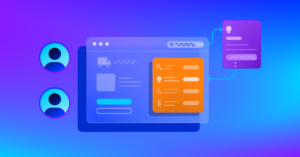Improved customer service, customer loyalty, and improved ROI are three things every organization would like to achieve overnight. This is possible, although not overnight, with the right software and work.
One such method is the Customer Journey Map, and it sits at the very top, along with other powerful tools that help drive effective customer-facing change.
In this guide, we’ll explore the steps you must take to create a customer journey map that delivers the results you expect and avoids common mistakes others make.
What Is A Customer Journey Map?
Customer expectations are rising, and they will continue to grow, forcing companies to reinvent themselves in order to survive constantly. Cause? Availability of many products and services under different brands and with various offers. In addition, the availability of online platforms, mainly social media platforms, has given buyers greater control over their decision-making.
It is in this case that the customer journey map has become famous. Also known as a customer experience map, this tool visualizes an organization’s customer experience.
Build A Buyer Persona
Creating a customer journey map starts with defining a buyer persona, which is a target customer profile based on extensive research.
The buyer persona usually consists of demographics such as age, demographic, gender, career, etc., in addition to other behavioral details such as goals, interests, lifestyle, issues, etc. buyer. For example, if you develop an accounting system, your buyer persona is small businesses and startups that need to use accounting systems.
Your business may have one or more buyer personas depending on how many audiences targets your target. And to avoid creating a too general customer journey map, you need to create unique customer journey maps for each of the audiences you have identified.
Understand Customer Goals
This is where you must focus your attention on knowing the goals your clients are trying to achieve at each stage. When it comes to optimizing the customer journey, knowing what your customers are trying to achieve will help a lot. So create helpful and unique blog content for your customers and give them relevant information.
Some methods you can use here include questionnaire answers, interview transcripts, customer support email messages, user testing, etc.
Determine The Components You Need To Focus On
There are several parts of customer journey maps, each focusing on a different element. Based on your goals, you can choose one of them.
Current Status: These cards show how your customers interact with your brand and how your media PR campaign influences that.
Future State: This type of journey map visualizes the experiences you expect or believe will be taken by your clients and customers.
Remove Obstacles
Now that you know what problems/obstacles your customers face when interacting with your brand focus on prioritizing and eliminating them to improve every touchpoint and keep customers on every step of the way.
Customers are constantly changing, so your customer journey maps should continuously be changing. Test and update customer journey maps as often as needed to reflect changes in your customers as well as your products/services.
Conclusion
Customer Journey Maps are an excellent method to get a deeper understanding of your customers and their actions with your business. Exploring how your customers connect with you, how they feel, and what they want to get can go a long time and way in retaining them.

![HubSpot's 2025 State of Blogging Report [Data from 500+ Marketers]](https://www.liveseo.com/wp-content/uploads/2025/02/HubSpots-2025-State-of-Blogging-Report-Data-from-500-Marketers.webp-300x300.webp)


